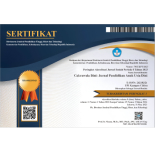The Role of Teachers in Promoting Play-Based Learning in STEAM Education in Early Childhood Education
Abstract
Keywords
Full Text:
PDFReferences
Alghamdi, A. A. (2023). Exploring early childhood teachers’ beliefs about STEAM education in Saudi Arabia. Early Childhood Education Journal 51(2), 247–256. https://doi.org/10.1007/s10643-021-01303-0
Alharbi, M. O., and Alzahrani, M. M. (2020). The importance of learning through play in early childhood education: Reflection on the Bold Beginnings Report. International Journal of the Whole Child, 5(2), 9-17. https://libjournals.mtsu.edu/index.php/ijwc/article/view/1927
Ali, E., Constantino, K. M., Hussain, A., and Akhtar, Z. (2018). The effects of play-based learning on early childhood education and development. Journal of Evolution of Medical and Dental Sciences, 7(43), 6808-6811. https://doi.org/10.14260/jemds/2018/0000
Atkinson, L. Z., and Cipriani, A. (2018). How to carry out a literature search for a systematic review: A practical guide. BJPsych Advances, 24(2), 74–82. https://doi.org/10.1192/bja.2017.3
Bertrand, M. G., and Namukasa, I. K. (2023). A pedagogical model for STEAM education. Journal of Research in Innovative Teaching & Learning, 16(2), 169-191. https://doi.org/10.1108/JRIT-12-2021-0081
DeJarnette, N. K. (2018). Implementing STEAM in the early childhood classroom. European Journal of STEM Education, 3(3), 1-9. https://doi.org/10.20897/ejsteme/3878
Edwards, S. (2017). Play-based learning and intentional teaching: Forever different?. Australasian Journal of Early Childhood, 42(2), 4-11. https://doi.org/10.23965/AJEC.42.2.01
Elliott, V. (2018). Thinking about the coding process in qualitative data analysis. Qualitative Report, 23(11), 2850-2861. https://nsuworks.nova.edu/tqr/vol23/iss11/14
Elly, S. (2015). Play and playfulness in early childhood education and care. Psychology in Russia: State of the Art, 8(2), 27-35. https://doi.org/10.11621/pir.2015.0203
Hoskins, K., and Smedley, S. (2019). Protecting and extending Froebelian principles in practice: Exploring the importance of learning through play. Journal of Early Childhood Research, 17(2), 73-87. https://doi.org/10.1177/1476718X18809114
Larkin, K., and Lowrie, T. (2023). Teaching approaches for STEM integration in pre- and primary school: A systematic qualitative literature review. International Journal of Science and Mathematics Education, 21(1), 11–39. https://doi.org/10.1007/s10763-023-10362-1
Li, L., and Disney, L. (2023). Young children’s mathematical problem solving and thinking in a playworld. Mathematics Education Research Journal, 35(1), 23-44. https://doi.org/10.1007/s13394-021-00373-y
Lockwood, D. (2023). Challenge-based learning & STEAM curriculum. The STEAM Journal, 5(1), 1-7. https://doi.org/10.5642/steam.ZFXX7073
Mong, C. J., and Ertmer, P. A. (2013). Addressing STEM education needs: The case for adopting a PBL approach. Educational Technology, 53(3), 12-21. https://www.jstor.org/stable/44430147
Ng, A., Kewalramani, S., and Kidman, G. (2022). Integrating and navigating STEAM (inSTEAM) in early childhood education: An integrative review and inSTEAM conceptual framework. EURASIA Journal of Mathematics, Science and Technology Education, 18(7), 1-17. https://doi.org/10.29333/ejmste/12174
Pyle, A., and DeLuca, C. (2017). Assessment in play-based kindergarten classrooms: An empirical study of teacher perspectives and practices. The Journal of Educational Research, 110(5), 457-466. https://doi.org/10.1080/00220671.2015.1118005
Skoss, M. (2018). Bringing STEM to Life: Understanding and recognising science, technology, engineering and maths. Australian Primary Mathematics Classroom, 23(3), 7-8. https://link.gale.com/apps/doc/A559523800/AONE?u=anon~d19b64df&sid=googleScholar&xid=cab52996
Sydon, T., and Phuntsho, S. (2022). Highlighting the importance of STEM education in early childhood through play-based learning: A literature review. RABSEL: the CERD Educational Journal, 22(1), 1-19. https://doi.org/10.17102/rabsel.22.1.3
Taylor, K. S., Mahtani, K. R., and Aronson, J. K. (2021). Summarising good practice guidelines for data extraction for systematic reviews and meta-analysis. BMJ Evidence-Based Medicine, 26(3), 88-90. https://doi.org/10.1136/bmjebm-2020-111651
Taylor, M. E., and Boyer, W. (2020). Play-based learning: Evidence-based research to improve children’s learning experiences in the kindergarten classroom. Early Childhood Education Journal, 48(2), 127-133. https://doi.org/10.1007/s10643-019-00989-7
Truelove, S., Vanderloo, L. M., and Tucker, P. (2017). Defining and measuring active play among young children: A systematic review. Journal of Physical Activity and Health, 14(2), 155-166. https://doi.org/10.1123/jpah.2016-0195
Wanyi, P., Nor, M. M., and Zhengan, M. (2022). The use of STEAM approach in preschool for children’s holistic development. JuKu: Jurnal Kurikulum & Pengajaran Asia Pasifik, 10(2), 47-60. https://adum.um.edu.my/index.php/JUKU/article/view/37070
DOI: https://doi.org/10.17509/cd.v15i2.74417
Refbacks
- There are currently no refbacks.
Copyright (c) 2024 UPI Kampus Cibiru

This work is licensed under a Creative Commons Attribution-ShareAlike 4.0 International License.
Cakrawala Dini: Jurnal Pendidikan Anak Usia Dini
Published in collaboration Program Studi PGPAUD UPI Kampus Cibiru, APG PAUD Indonesia, and PPJ PAUD Indonesia

Cakrawala Dini: Jurnal Pendidikan Anak Usia Dini is licensed under a Creative Commons Attribution-ShareAlike 4.0 International License.
Based on a work at https://ejournal.upi.edu/index.php/cakrawaladini.














